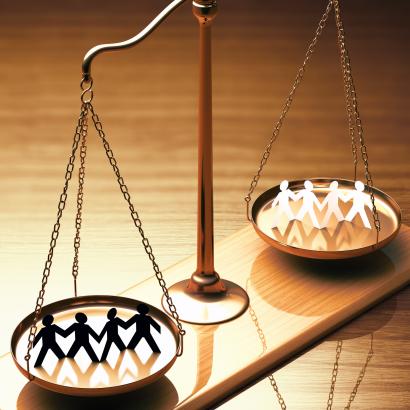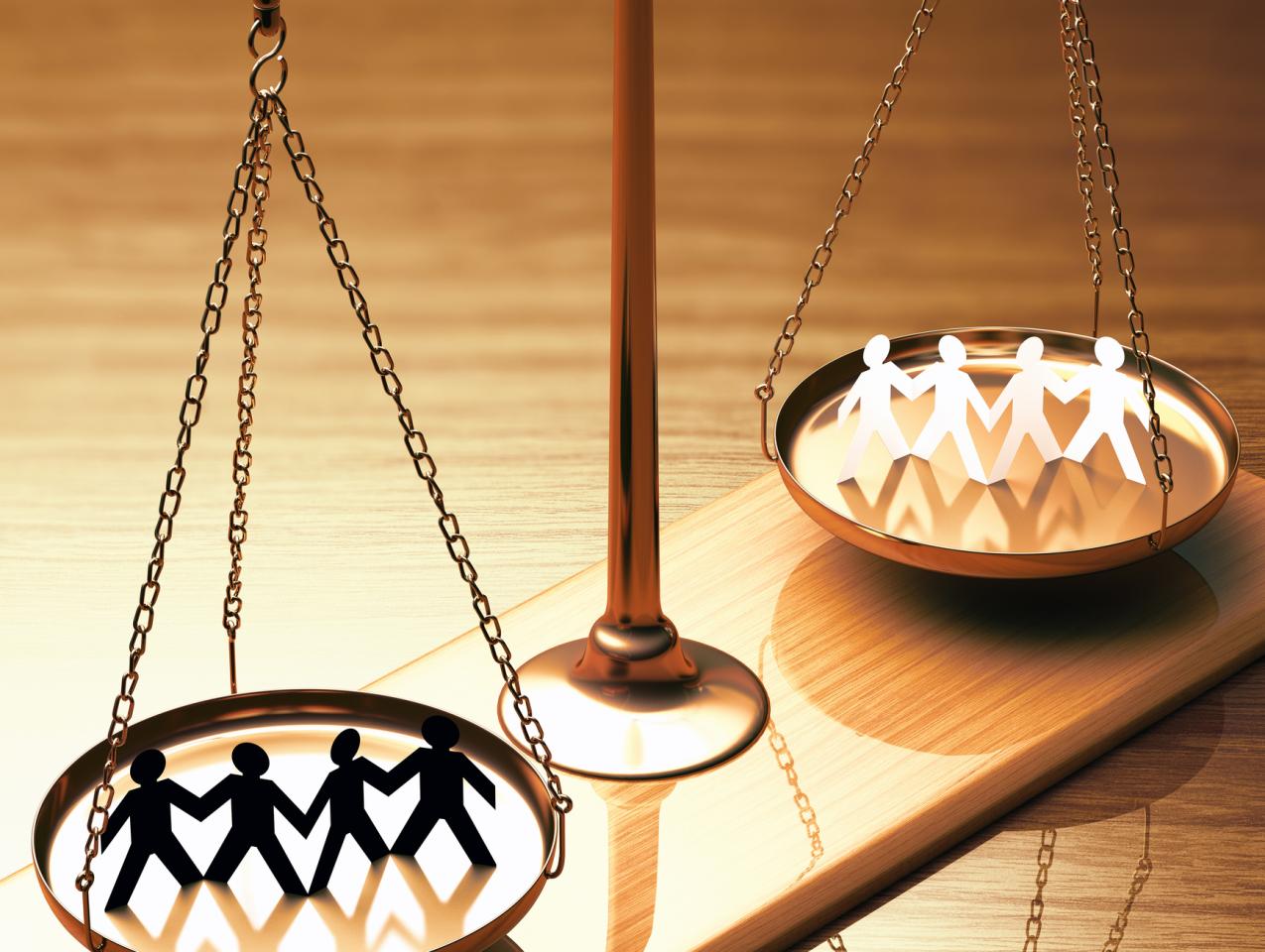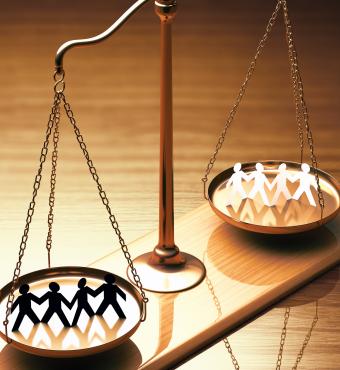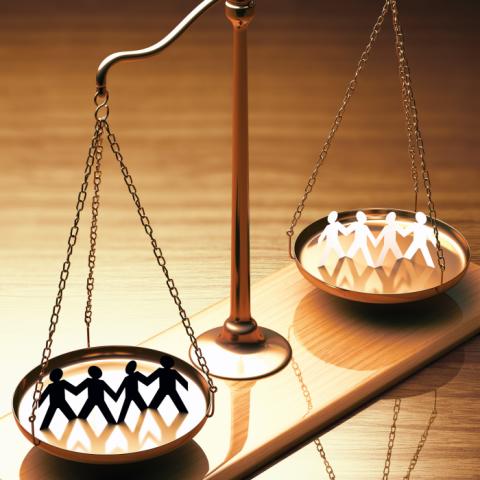- Law & Policy
- Civil Rights & Race
The principles of racial reconciliation
As the American Century comes to a close, we are losing our ability to say what it means to be an American. We are forgetting the handful of compelling ideas that have forged individuals from so many backgrounds into one nation, indivisible. The optimistic sense of national purpose that helped our parents and grandparents survive a depression, win a world war, and shoot for the moon is giving way to pessimistic identity politics.
We are Italian-American, Chinese-American, African-American, Scots-Irish-American--there are so many hyphenated versions of us we can hardly keep count. We cherish our regional accents, research our family roots, and burst with pride at ethnic dinners. We are proud of where we have arrived from, and rightly so, but we are forgetting that we have always been prouder of where we have arrived; prouder of saying, "We are all Americans."
America is a great country not because we are the world’s largest collection of ethnic groups, but because we are a remarkable collection of individuals who share a few principles that make us one nation. One reason we are pulling apart as a country is that we are increasingly preoccupied with the differences that divide us instead of the principles that unite us.
The latest symptom of this divisive tendency is President Clinton’s Commission on Race. Last month, it issued its final report, the culmination of 14 months of "dialogue" involving 17,000 Americans in 39 states. Despite its title, "One America in the 21st Century," its central finding is that America suffers from too little race-consciousness. And its recommended remedy? More race-consciousness. Before issuing his report, commission chairman John Hope Franklin wrote to the president: "The idea that we should aspire to a color-blind society is an impediment to reducing racial stereotyping. . . . The best way to reduce racial stereotyping is to be conscious of racial differences."
The report recommends that the president make this all-race-all-the-time approach to national unity permanent by institutionalizing his commission on race. The proposed "President’s Council for One America" would pick up where the commission left off: carrying on the "great and unprecedented conversation about race."
This is the wrong conversation. I understand where the president is coming from, considering where he grew up, and where John Hope Franklin grew up, and where I grew up. No southerner who has experienced the indignity of black Americans being pushed to the back of the bus, sent to separate hospitals, relegated to separate bathrooms, and kept out of many of the best schools and colleges because of their race can remain indifferent to the legacy of discrimination. And no one can look at our elite college campuses today, at the boardrooms of Fortune 500 companies, and at those who seem permanently consigned to lower-paying jobs, without wanting to open opportunity to Americans of all races.
But the president has started the wrong conversation. With all due respect, he has the wrong ideas about what it means to be an American. In his 1997 State of the Union address, the president said America’s greatest strength is its diversity. He must have been the first president of the United States ever to say that, and I hope he will be the last.
Of course diversity can be a great strength. But diversity is not America’s greatest strength. Bosnia is diverse. Rwanda is diverse. Quebec is diverse. Racial and ethnic differences are tearing those places apart. America’s greatest strength is that we are the only nation that, as Margaret Thatcher observed, "has so successfully combined people of so many different races and nations within a single culture."
So shouldn’t our national conversation be about what pulls us together instead of what pulls us apart? Think about the times when America has been at her best: winning our freedom at Lexington and Concord, defending that freedom on the beaches of Normandy, and marching together in Selma, Alabama, to secure freedoms for every American. During those times we united around a common set of principles: equal opportunity, individual rights, self-government. From these principles flows the path to racial reconciliation.
Five Questions
So let me propose that the president go ahead with his new Council for One America, but stop wallowing in what divides us and start celebrating what unites us. Let me suggest five challenging topics, one for each of the first five meetings of the new council, and make recommendations that would help bring us together as one nation.
How do we make good
on the promise of equal opportunity?To be an American means that each one of us has an equal opportunity at the starting line to pursue the American Dream. This promise of American life is right there in our nation’s birth certificate, the Declaration of Independence: "All men are created equal."
To make good on this promise 44 years ago, the U.S. Supreme Court, in Brown vs. Board of Education, opened schoolhouse doors that had been closed to blacks on the basis of their race. To make good on this promise today, the president’s council should recommend that Congress create Hope Scholarships for Children so that middle- and low-income families can send their children to good, safe neighborhood schools of their choice--public, private, or religious. As Diane Ravitch has written, no poor child should have to go to a bad public school.
The council should also say unequivocally that it is time for the government to stop making distinctions based on race. No discrimination; no preferences--period. Let me give you two personal examples of why I believe this.
Our "national conversation on race" should be aboutWhat unites us as a nation, not what pulls us apart.
In 1962, when I was a senior at Vanderbilt University in Nashville, I was among those who fought successfully to change the rules of admission. At that time the university refused to admit African Americans. Racism was the rule. Nearly 30 years later, on my first day as President Bush’s Secretary of Education, I was presented with this eerily familiar question: Is it right for the government to grant college scholarships solely on the basis of race?
I said no. We should provide scholarships for low-income Americans of every race, yes. But scholarships based solely on race, no. If we want to be one country, I do not see how we can consider a group of students and say, "I have a scholarship for the Chinese American, but not for African Americans; I have one for the Irish American but not one for the young woman whose parents came from Chile." Scholarships should be for every student who needs help, without regard to race.
It’s time to acknowledge that for the last 30 years we have made a mess of race relations by trying to label each other and by trying to end discrimination through new forms of discrimination. Forced cross-town busing for racial balance has done more harm than good to our schools, our children, and our communities. As a former university president, I have seen how racial preferences placed students into colleges for which they were unprepared. On the other hand, I have seen that when our own state raised college admission standards, minority students arrived better prepared--and more were able to succeed.
At the university, I saw that race-based affirmative action did not succeed in making our college campuses look more like our country. And looking into America’s past, I saw how today’s stepladder can become tomorrow’s ceiling. Discriminatory admissions policies once set upper limits on the number of Jews at Dartmouth and the number of Asians at Berkeley. I believe opportunity in America means stepladders without a ceiling.
How do we restore support
for our common language?Being an American must mean mastering our common language. On his famous journey through America in the early 1800s, Alexis de Tocqueville wrote, "The tie of language is perhaps the strongest and most durable that can unite mankind." It should be obvious that if we want to be one country, we must be able to talk to each other; to talk with each other, we must have a common language. But somehow this principle has become controversial, so much so that the people of California had to resort to passing a ballot initiative to require the state’s public schools to teach all the children America’s common language.
The Council for One America should recommend ending failed bilingual-education programs that deprive millions of children of their ticket to success.
Proficiency in English has always been a requirement for citizenship, because it is indispensable to success in this country. The president’s council should recommend unequivocally ending failed bilingual-education programs that deprive millions of children of their ticket to success. Then the council should go one step farther: Take the money spent on bilingual programs and fund "English for the Children" scholarships for middle- and low-income families. Parents could use these scholarships at public schools, private schools, after-school programs, or any other accredited program they believe will help their child learn English.
Since millions of adults also need help learning English, the council should recommend that Congress charter a public/private bank, the English USA Corporation, to offer a loan to anyone who needs help learning English. This loan could be paid back over the long term by the borrower and by private donations from those who believe that encouraging a common language is essential to making America one country.
How can we express an optimistic view of immigration and still control our borders?
To be an American means to be proud that this is a nation of immigrants.
Virtually every American family, if it looks back far enough, has a similar story: immigrants coming to the New World, working together, praying together, and sacrificing so that their children would have a better life than they had.
We lose this generous view of immigration when we view immigration through the prism of race. Seeing new Americans simply as members of different racial and ethnic groups polarizes us around two divisive and equally incorrect extremes. On the one side are the ideologues of the Right who claim that many (if not most) immigrants are incapable of assimilating to American culture and that it is time to close the doors to new immigration. On the other side are the ideologues of the Left who say there is no such thing as American culture and who equate assimilation with a loss of personal identity.
The president’s council could help by rejecting both extremes and recommending a two-pronged approach that embraces immigration as a principle of national unity. First, it should maintain the distinction in our laws and our minds between those who are legally here--paying taxes, following the rules--and those who are here illegally. That means replace the Immigration and Naturalization Service with a consolidated new federal effort to stop illegal immigration. Second, because of the larger number of new Americans today, we should work harder to help immigrants become Americans. Being an American is not a matter of looking the same, or having grandparents from the same part of the world; it is a matter of believing in common principles. In The Unmaking of Americans, John J. Miller describes the process as "Americanization." First, one learns English, and then one learns the handful of ideas that form the core of the American identity: freedom, individual rights, equality under the law, hard work, and the importance of good character.
How do we save our greatest unifying
institution, the public school,
while ensuring that no child is
forced to go to a bad public school?To promote Americanization, we must have the best possible system of public schools. In the late 1980s, I was attending a conference of business leaders and educators when Notre Dame president "Monk" Malloy brought the discussion to a complete stop by posing this question: "What is the rationale for the public school?" After what seemed like an eternity of embarrassed silence, the late Albert Shanker, the president of the American Federation of Teachers, provided the answer: to teach children what it means to be an American.
Shanker was right. The common school was created a century and a half ago to teach children--especially immigrant children--to read and speak English, to form good character, and to understand what it means to be an American. In 1941, the National Education Association even published The American Citizen’s Handbook, a virtual user’s guide to America that included everything from the Future Farmers of America Creed to the Gettysburg Address.
The President’s Council for One America should reaffirm America’s commitment to a strong system of public education--and to a curriculum that helps teach children their legacy as Americans. It could start by explaining why the motto on our national seal, created by the committee of Benjamin Franklin, John Adams, and Thomas Jefferson, is E Pluribus Unum, "out of many, one," and not "out of one, many."
In addition, the council should recommend that over time our country create New Public Schools. By this I do not necessarily mean new buildings, or new students and teachers, but reborn institutions, with a new spirit and new ways of doing things. The organizing principles of these New Public Schools should be the same as those that helped American colleges become the best in the world: autonomy and choice. To ensure autonomy, every public school should have the same freedom from union rules and government regulations that charter schools have. Good teachers should be paid more, and teacher tenure as we know it should end. And the Hope Scholarships would allow every child to enter a good, safe school--public or private--of his or her choice.
How do we challenge and encourage
a new age of responsibility?American citizenship guarantees rights, yes, but also confers responsibilities. Unfortunately, as Newton Minow has said, we are becoming a nation in which everyone has a right and nobody has a responsibility. This is what happens when you are afraid to say that some things are right and some things are wrong. Standards are under attack by moral relativists who believe what is right and what is wrong depends on whom you ask. And these people who say there are no common standards are usually the same ones who say there are no principles that unite us as a nation. But when we let go of our standards and abdicate our responsibilities, someone else--usually the government--gains greater control over our lives.
Although our sense of right and wrong comes from many sources, the first and most important source is our family. Twenty years ago, Americans suffered from a rising "misery index," a painful combination of inflation and unemployment. Today the new misery index is an even more painful sum of statistics about broken families and troubled children.
One reason for this is that, for the last 30 years, our government and our culture have declared war on the family by paying people not to marry, by penalizing those who do, and by making divorce easier, adoption harder, and household discipline illegal. During that time, the federal tax burden on families with children has increased by five times, from 5 percent of income to 25 percent. We are depriving millions of children of a good education and have all but given up in the war on drugs. The media elite has piled on, telling us that marriage is unnecessary, fathers are old-fashioned, and Jerry Springer is an acceptable successor to Captain Kangaroo.
The president’s Council for One America should recommend that our society place a higher value on the work of parents raising children, that we learn again to honor the job of father and mother. We should triple the tax deduction for each child to $8,000, restoring its former value. End the marriage penalty. Create education savings accounts to help parents pay for school and college and create Individual Security Accounts to help them save for retirement and for the care of older relatives.
The council’s final admonition should be addressed to us parents: Government can’t raise children, only we can. Only we can turn off the TV, read to toddlers, and teach our children the standards to live by. Only we can teach new generations that children having children is wrong, and that marriage before childbirth is right, and that both parents have a responsibility to nurture their child until adulthood. Only we can insist that our athletes and our politicians, right on up to the president, act as role models for our children.
The legacy of our generation ought to be that we began the new century with an era of responsibility that secured our freedoms and united our country.
Our parents’ and grandparents’ legacy is secure. Their struggle for freedom created the American Century. The question is: What will our legacy be, a hundred years from now? I want it to be that we began the new century with an era of responsibility that secured those freedoms and united our country. Our parents made it their business to try to understand what was right, what was wrong, and what it meant to be an American. They taught us that from suffering comes endurance and from endurance comes character and from character comes hope. If we accept our responsibilities as well as they accepted theirs, then we, the parents of this generation, can help to create a new American Century as glorious as this one.















